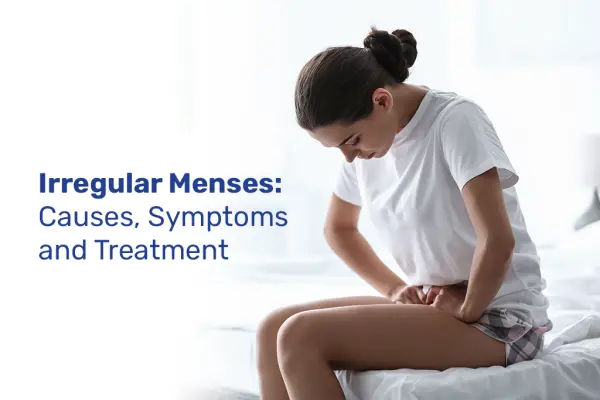The primary hormones in regulating the timely ovulation and menstrual cycle are follicle-stimulating hormone, luteinising hormone, estrogen, and progesterone. Menses irregularities can result from anything that affects or disrupts these hormones’ natural rise and fall throughout each cycle.
Irregular menses are not unusual and normally pose no danger. Many factors can contribute to irregular menses, including:
- Hormonal changes
- Extreme exercise or sudden weight fluctuation
- Stress
What Are the Causes of Irregular Menses?
Irregular menses are linked to specific medical issues. Some of the underlying causes of irregular menses are as follows:
- Polycystic ovarian syndrome: Women and girls who are suffered from PCOS have high levels of androgens and a disturbed FSH/LH ratio. This prevents or delays ovulation, which causes irregular periods, and some PCOS patients may have completely unpredictable menstruation.
- Primary ovarian insufficiency: It is a disorder that affects women under the age of 40 whose ovaries have stopped functioning regularly, preventing them from having regular cycles. It can happen if a woman is born with fewer-than-normal eggs that run out earlier. Patients with certain genetic disorders, autoimmune diseases or those who have received chemotherapy or radiation therapy for cancer may also suffer from primary ovarian insufficiency. Testing AMH levels will help define the ovarian reserve.
- Thyroid or pituitary gland abnormalities: Thyroid or pituitary gland issues like hypothyroidism (an underactive thyroid), hyperthyroidism (an overactive thyroid), and hyperprolactinemia may affect your hormones. Your menstrual cycle becomes irregular as a result.
- Ovarian or uterine cancer: Some tumours might interfere with a person’s menstrual cycle.
- Lifestyle factors: Stress, a dramatic change in weight gain or loss, long-distance runners, dancers, or gymnasts who engage in exercises that produce very little body fat, and viruses or different diseases.
- Hormone-containing birth control pills: Most birth control pills include estrogen and progesterone hormones. By preventing your ovaries from releasing eggs, the drugs stop you from getting pregnant. Menstruation may change if you start or stop taking birth control pills without proper medical guidance.
What Are Irregular Menses Symptoms?
The symptoms may vary from person to person, but some of the common symptoms are as follows:
- When the menstrual cycle occurs less than 24 days
- When the menstrual cycle occurs longer than 38 days
- A monthly menstrual cycle that varies by more than 20 days
What Is Irregular Menses Treatment?
Period irregularity is a common occurrence and doesn’t need to be treated if happening very occasionally. Contraception, perimenopause, and irregularities caused by adolescence do not normally require medical treatment. However, it should be identified, and the patient should be counselled accordingly. A woman must consult a doctor if:
- The problem is ongoing and has an unknown underlying cause.
- An illness or medicine could be the reason for irregular periods.
- Along with other symptoms like pelvic pain, irregular periods occur when a woman desires to become pregnant.
- A physician can identify the underlying reason if there is anything. The cause of the abnormality will determine the course of treatment.
The potential treatment suggestions could be:
- Hormone therapy: Birth control pills containing progesterone and estrogen can stabilise hormone levels, which can help counterbalance the effects of ovulation. Additionally, it may make the bleeding more regular and manageable or lessen the discomfort.
- Maintain a healthy weight: Irregular menses can be affected by both excess and insufficient body fat. Maintaining a healthy weight helps lower insulin resistance in those with PCOS who have increased body weight. As a result, testosterone levels drop, and ovulation chances rise. A 5% weight loss can positively affect regulating the menstrual cycle.
- Treatment for mental health problems: If anxiety, stress, depression, or an eating disorder are responsible for irregular periods, a doctor may suggest psychological help. For many people, this frequently involves receiving therapy with a psychologist. A multidisciplinary team will offer regular treatment sessions, dietary guidance, and support groups for people with eating disorders.
If the problem persists for too long, visiting a qualified gynaecologist is important. A proper evaluation and diagnosis are needed to find the problem’s root cause. The doctor will suggest lifestyle changes, medications, or surgical procedures, whenever necessary.

